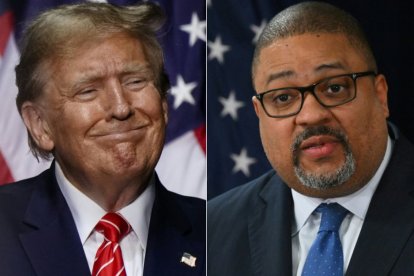The New York Court of Appeals denies Trump's motion to delay the Stormy Daniels trial and there is already a date for jury selection
On April 15, the court case will formally begin where Manhattan prosecutor Alvin Bragg accused the former president of 34 counts of falsifying business records in the first degree.

Donald Trump junto con el fiscal de Manhattan, Alvin Bragg. (AFP)
The trial of former President Donald Trump in the case of alleged hush payments to porn actress Stormy Daniels already has a date officially set for jury selection: April 15.
This Monday, the New York Court of Appeals denied Trump's defense motion to delay the trial and move the venue out of New York state, confirming that jury selection will begin next week.
Trump's request to the Appellate Division First Department in New York said that "polling and quantitative analysis of media coverage shows that a fair and impartial jury cannot be selected right now based on prejudicial pretrial publicity."
However, the defense was unsuccessful in its appeal.
"Defendant's application for a stay of trial…pending the determination of defendant's motion for change of venue, is denied," Judge Lizbeth González decided Monday, rejecting the defense's motion.
The rejection by the New York Court of Appeals comes a week after Manhattan Judge Juan Merchán, who is presiding over the trial and is being heavily questioned by the defense, denied Trump's attempt to delay the trial.
The former president's team had requested that the trial be suspended to await the United States Supreme Court ruling on presidential immunity in the case.
If the court agreed to Trump's requests, prosecutor Alvin Bragg's case would be tremendously affected because the Supreme Court is scheduled to hear arguments on the matter on April 25 and is expected to issue a ruling in mid-June.
The former president's legal team maintains that Trump is immune from prosecution for conduct that, according to their version, involves official acts during his term. Trump's lawyers say that some of the evidence and alleged acts in the case of money allegedly paid to Daniels overlap with his stay at the White House and, therefore, constitute official acts.
For his part, Bragg last year charged Trump with 34 counts of falsifying business records in the first degree.
These charges are related to alleged payments that the president made to Daniels during the 2016 presidential campaign to buy her silence.
Bragg said in his indictment that Trump "repeatedly and fraudulently falsified New York business records to conceal criminal conduct that hid damaging information from the voting public during the 2016 presidential election."
However, the former president maintains his innocence and calls the investigation against him a witch hunt.












